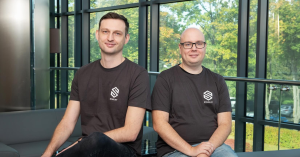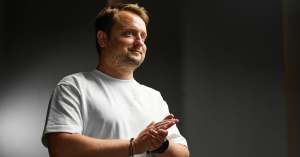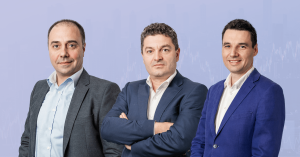Ekaterina Almasque is a general partner at OpenOcean, an early-stage venture capital firm investing in B2B software across Europe with offices in London & Helsinki. They have created technology leaders like MySQL, TrueCaller, GraphCore, and Mapillary.
She has been investing in AI, data infrastructure, disruptive B2B software platforms, and cybersecurity across the globe for over 15 years, having lived in Silicon Valley and several countries in Europe and Latin America.
Before joining OpenOcean in 2019, Ekaterina was a Managing Director at Samsung Catalyst Fund in Europe. She has led strategy and investments into disruptive sectors such as autonomous driving, cloud, and health tech.
Ekaterina is a savvy technologist, who started her first software business at the age of 17. Later, she led the creation of some of the first e-commerce and disruptive technology platforms in the 90s and early 2000s.
Today, she’s а trusted mentor and advisor on companies like IQM, Binalyze, HyGraph, LatticeFlow, Bitrise and Sunlight.io.
In this interview for The Recursive, we dive deep into OpenOcean’s investment philosophy, originating from a background in open source and driven by the success story of MySQL.
We talk about the emerging AI trends shaping the European startup landscape separating the market hype from actual capabilities and how disruptions in various industries due to AI advancements may render older technologies obsolete.
Read further to find out which will be the focus areas for growth in the European investment landscape in 2024 and explore useful tips for founders who want to enhance their strategic thinking.
The Recursive: Could you elaborate more on OpenOcean’s investment philosophy and how it’s evolving to reflect the current macroeconomic situation?
Ekaterina Almasque: OpenOcean originates from the background of building open source, hence the name “open.” The ocean represents the dream. The founders of the fund were behind MySQL, one of Europe’s first technology unicorn exits. Sun Microsystems acquired it, and was subsequently acquired by Oracle. MySQL wasn’t just Europe’s first technology unicorn; it was also the first commercially successful open-source product. Figuring out how to sell open source was very important. Now, open source is everywhere but the foundation was built then.
The story of the founding team is amazing. Now, in our third fund, we invest in early-stage companies across Europe, but our DNA stays true to the beginning. We love building ecosystems, particularly at the start of new tech waves – whether in cloud, mobile, AI, or quantum. We like being there from the beginning, figuring out how to commercialize technology together with the ecosystem, and connecting people.
Founders respect us because of our history with MySQL. But we continuously build unicorn companies out of Europe like Truecaller.
Our focus remains B2B software. What we like to see in the very early stages is a product that works very well and that customers love, but with an intrinsic value to become a platform. We believe that building this ecosystem will result in much better returns for investors and much better success for entrepreneurs. We are looking for those gems across Europe.
Leveraging network effects for ecosystem creation isn’t trivial. Do you believe this expertise benefits the companies you invest in?
Absolutely. We look for founders with a vision. Network effect comes at some point but founders need to have a vision. How do they become bigger than a single product? How do they build these ecosystems? If the product can scale left and right?
This is where we have unique expertise. We are a technology-oriented fund among many in Europe. We try to assess those capabilities of scalability. And we believe that we can do it earlier than many in the market. We can go in early series A, even pre-Series A, with the understanding of how this could scale or how to improve the product market fit to become a larger story.
You’ve been investing in AI for over a decade. What excites you about the current AI innovations, and how do you approach safety concerns and societal impact?
I graduated in AI in the ’90s. Back then we dreamed of building artificial intelligence brains, but there was no computing power. Everything was theoretical. The breakthrough came in 2006 with the innovation called deep learning. It allowed us to create a shortcut to bridge the gap in the computing power and what we needed to build in algorithms.
This hungry algorithm with trillions of features actually started in 2006 with the deep learning breakthrough. Now there is a huge hype because normal users at home could see the advantage of ChatGPT and this created a spark. As we have been investing for so long in artificial intelligence, we try to separate what is the storytelling in the market from what is the actual capability. We see a huge gap and a huge potential.
In the B2B space, enterprises have no easy way to adopt AI. They miss the whole stack of tools to develop and deploy AI at scale and this is a huge bottleneck.
Our fund prefers to invest in companies like LatticeFlow that bridge this gap for enterprises. They bring trustworthiness to the whole AI process.
We love this space and we think it’s a huge opportunity – several multi-billion companies can be built just in the stack, allowing to debug and deploy AI.
What are the emerging trends that will significantly impact the landscape in the next five years?
AI is becoming mainstream. This is a positive trend because people used to fear AI and now they start to understand the benefits in real terms. We can detect cancer much earlier. We can bring education to places where it wasn’t possible before because of the cost. We can reduce costs in many domains.
Enterprises also started to be more aware that the opportunity of AI is double that of the cloud. They are waking up, saying, “I can be out of business if I’m not deploying AI at scale.” Enterprises will invest fiercely to stay competitive in the new AI world.
On the flip side, there’s the societal fear of the force of AI, аnd governments trying to understand what they are dealing with. Is it dangerous or not?
I fear that upcoming regulations will prohibit this early breakthrough technology from developing fast. It can hinder the competitive edge of European startups. I think startups, venture capital funds, and people who are building those systems should be involved in the regulation discussions.
The biggest disruption is that a lot of technologies that have been developed before AI might become obsolete. As investors, we are worried about what our investment landscape in other areas will look like as we see the AI disruption. Should we even consider some areas in the future as everything is changing?
We don’t know the answer yet. This is an emerging force and we need to think hard about what it means for all of us.
Do you foresee any companies in your portfolio being threatened by AI adoption?
Certainly. Certain areas relying on older data analytics approaches face risks due to newer, more efficient methods.
Which verticals do you expect to experience significant growth in Europe in 2024?
Data infrastructure is the backbone of the future data economy. However, Europe has underinvested in data infrastructure for many years and it strategically hurts Europe’s access to computational power in AI or quantum. I think the awakening to the idea that we have to develop and control our own strategic assets will be trend number one.
There will be a lot of investments and a lot of startups specifically in this area. Unfortunately, we don’t see a lot of expertise.
Next, Climate change is a very hard problem and we need to develop technology with this in mind. Even AI when not done carefully can consume so much energy and water. We need to think about developing AI that is less hungry and more climate-conscious.
I think that in the next five years, people will start thinking much more about how to do technology development and progress without hurting our planet.
There will be a huge shift to Europe in terms of developing breakthrough startups. We have a lot of emerging talent in Europe and across technologies and people are now less keen to relocate to the US.
I remember UiPath years ago was like a wonder. It was a challenge for investors to accept that a great founder can come from someplace not known before.
I think we are approaching a booming time, when there is suddenly an explosion of quality startups from across Europe in more challenging and strategic areas like data infrastructure.
You have Polish and Hungarian companies in your portfolio. What are your observations on the development of the CEE tech landscape? Is the region becoming more attractive for European VCs?
CEE is becoming more attractive. The reason for this is simple. There are more serial entrepreneurs and more developed ecosystems. It is much easier to invest when you have success stories, and when you have people who have done this before and who coach others.
For instance, we have an investment in Booksy, a Polish company started by a serial entrepreneur.
UiPath has created a lot of startups with founders who have been in UiPath and have learned from the journey of scaling the company. Now they are trying to do the same.
We are proactively exploring the region – Bulgaria, Lithuania, Estonia, Latvia – trying to understand who are the next great entrepreneurs.
How did you transition to becoming a VC?
It was opportunistic and by luck. In 2006, I didn’t know what VC is and I met this person in Switzerland and they said: “You would be a perfect venture capitalist.” Then I started reading about venture capital and I loved it. I relocated to Silicon Valley. At the very beginning of my transition path, I learned from the best ecosystem in the world.
However, the path to becoming a venture capitalist was much more nuanced. I’m a technologist and I have started several software startups. I was a product manager at one of the first e-commerce products in Europe, the grandmother of Expedia or Booking.com.
Then I worked for five years for Siemens, working on distributed software architectures. I was in charge of standardization of protocols for mobile telephony. It was a great experience to see what’s the newest in the technology world. I’m very passionate about developing things that didn’t exist before – I have done it as a developer, as a manager, as a leader of teams within big corporations, and as an entrepreneur.
Now I’m coaching other people not only to create a new product but how to think more strategically, and how their product can be mass-adopted and scale globally.
Can you give any tips to founders wanting to enhance their strategic thinking?
I think the best way to learn is to talk to people who have been there, and who are plugged into the markets. The more an entrepreneur is plugged into the whole ecosystem, the more they will know. People will give them ideas about what’s missing or how to approach certain problems.
I moved to venture capital because I was talking to people who were helping me think strategically about my own life path.
Sometimes entrepreneurs stay very local or plugged into their own networks and don’t venture enough into other geographies, or other networks. This is how we learn and how we discover new opportunities.
We also learn from the mistakes of other people and this helps us to avoid those mistakes.
Being proactive and taking risks helps to develop strategic thinking.
As one of the professors at the business school in Switzerland used to say: “There is no wrong strategy. You just need to pick one and execute it.”








